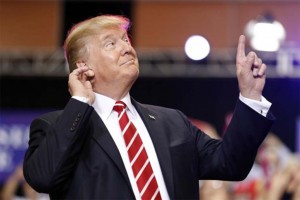
President Donald Trump is pushing tariffs on imported steel and aluminum. U.S. auto dealers and key Republicans criticized the plan.
Across the United States, auto dealers are usually among President Donald Trump’s most loyal supporters.
But Trump’s comment that he was prepared to impose tariffs on imported steel and aluminum, which are widely used in cars and trucks, which sent the stock market into a skid Thursday, brought a quick condemnation from those same dealers.
One group representing thousands of dealers, The American International Automobile Dealers Association said it was opposed to Trump’s plan to place a 25% tariff on steel and a 10% tariff on aluminum imports. Both metals are crucial to the production of cars and trucks sold in America today and would raise the sale prices of those vehicles substantially.
In addition to paying more for their vehicles, American consumers and workers can also expect to bear the brunt of the retaliatory tariffs other countries will almost certainly place on goods manufactured and exported from the United States, AIADA said in a statement distributed soon after Trump made his announcement.
(NAFTA talks halted, Trump proposes steel, aluminum tariffs. Click Here for the story.)
“Tariffs on steel and aluminum imports couldn’t come at a worse time,” said AIADA President and CEO Cody Lusk. “Auto sales have flattened in recent months, and manufacturers are not prepared to absorb a sharp increase in the cost to build cars and trucks in America. The burden of these tariffs, as always, will be passed on to the American consumer. Car shoppers looking for a deal will instead find that they are paying a new tax to transport themselves and their families.”
Steel and aluminum tariffs could directly counteract any benefits American manufacturers have seen from tax and regulatory reform. An analysis of tariffs on steel imposed in 2002 found that the Bush steel tariffs cost 200,000 jobs, including 30,000 in Michigan, Ohio and Pennsylvania alone, the AIADA statement said.
America’s 9,600 international nameplate auto dealers, the majority of which are family-owned businesses, employ more than 577,000 Americans, resulting in a payroll of $32 billion and an additional 527,000 indirect jobs. Last year, they sold 8.4 million vehicles to American consumers – 59% of total U.S. retail vehicle sales, AIADA said.
(Click Here for more about the rise in Mexican imports in 2017, despite Trump pushback.)
The threat of tariffs comes at a time when the auto industry as whole is trying to avoid a sales slump. Sales have dropped during the first two months of 2018 and prospects for a turnaround appear limited.
Normally, loyal Republican lawmakers also criticized Trump’s move.
Republican Sen. Pat Toomey, who represents the steel making state of Pennsylvania called the tariffs “a big mistake” that will increase costs on U.S. consumers, cost jobs and provoke retaliation from other countries.
(To see why ending NAFTA cripples U.S. trade, according to a Clinton aide, Click Here.)
NBC news said Toomey was one of numerous Republican lawmakers who denounced Trump’s proposal and pleaded with him to reconsider in what seemed to be an unprecedented level of GOP opposition to a Trump policy proposal in just over a year in office.

Economists will tell you, after the Black Friday crashing October 1929, the stock market had largely recovered by April 1930. Tariffs were put in place to protect U.S. industries, and THAT, along with premature cutting of govt supports (which we didn’t do this time) is what actually triggered the Great Depression. So why are we thinking of trying it again? When we are even more dependent on global trade?
Fred, I try to remain as non-political as possible on this site, but the president’s decision — which took even his economic and trade advisors by surprise, apparently — appears to be ill-conceived and unsupportable. While there may be reasons to raise flags about certain imports, this move seems likely to be hugely counterproductive. Significantly, even businesses that typically have supported many of Trump’s moves are now raising serious concerns.
Paul E.